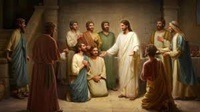Foundations of Biblical Christianity
and if Christ has not been raised, your faith is worthless; you are still in your sins.
1 CORINTHIANS 15:17
10/4/202512 min read
After Jesus was arrested, tortured, and crucified, His disciples scattered in fear. They hid behind locked doors, uncertain and disheartened. Some even returned to their old occupations—back to fishing—thinking their hopes had died with their Master. Yet, what followed after the resurrection was nothing short of miraculous.
The same men who once trembled at the mention of His name became fearless proclaimers of the gospel. What caused this transformation? The Book of Acts gives us the answer—it was not their strength, courage, or wisdom, but the power of the Holy Spirit.
Acts is not merely a record of human activity; it is the unfolding of divine activity through human vessels. It reveals the acts of the Holy Spirit working in and through believers. The Spirit turned fishermen into evangelists, doubters into preachers, and cowards into martyrs.
This same Holy Spirit is still at work today. He is not an impersonal force or distant energy—He is a person, the third Person of the Trinity. He is our Helper when we are weak, our Comforter in times of sorrow, and our Guide when we are uncertain of the path ahead.
Just as He empowered the early church, He empowers us today to live boldly for Christ. The transformation that began in the upper room continues in the hearts of believers who surrender to His presence. When we yield to Him, fear gives way to faith, hesitation turns into courage, and ordinary lives become extraordinary instruments of God’s power.
Prayer
Lord Jesus Christ,
Thank You for revealing Yourself as the living Son of God—real, risen, and reigning forever. You are not a story or a symbol, but the Savior who conquered death and changed history. Strengthen my faith in the truth of Your resurrection, and let its power transform my heart, my words, and my life.
Just as You turned fearful followers into bold witnesses, fill me with Your Holy Spirit so I may live courageously for You. Let my life be living proof that You are alive—bringing hope to the hopeless, peace to the troubled, and light to the darkness of this world.
In Your glorious name I pray,
Amen.
JESUS
ACTS 1:1 The first account I composed, Theophilus, about all that Jesus began to do and teach, 2 until the day when He was taken up to heaven, after He had given orders by the Holy Spirit to the apostles whom He had chosen. 3 To these He also presented Himself alive after His suffering, by many convincing proofs, appearing to them over a period of forty days and speaking of things regarding the kingdom of God.
The Gospel of Luke was the “first account” written by Luke, the beloved physician. In it, he carefully records all that Jesus began to do and teach during His earthly ministry.
The word “began” is deeply significant—it tells us that Jesus’ work did not end with His ascension. What He began in the Gospels, He continues through the power of the Holy Spirit in the Book of Acts and through His Church today.
Christ is not a figure of folklore or a comforting legend. He is a real, historical person whose life, death, and resurrection changed the course of human history. Christianity does not rest on myth or imagination, but on a concrete event—the resurrection of Jesus Christ—and on its enduring power to transform lives throughout the ages.
LUKE 1:3 it seemed fitting for me as well, having investigated everything carefully from the beginning, to write it out for you in consecutive order, most excellent Theophilus; 4 so that you may know the exact truth about the things you have been taught.
Luke, a careful historian and physician, wrote his Gospel after thoroughly investigating all the events of Jesus’ life from the very beginning. He organized his account in an orderly and reliable way for Theophilus—a respected believer whose name means “lover of God.”
Luke’s purpose was to give certainty and confidence about the truth of the Gospel, showing that faith in Christ rests not on myth or emotion, but on verified, historical truth.
JOHN 20:26 Eight days later His disciples were again inside, and Thomas was with them. Jesus came, the doors having been shut, and stood in their midst and said, “Peace be to you.” 27 Then He said to Thomas, “Place your finger here, and see My hands; and take your hand and put it into My side; and do not continue in disbelief, but be a believer.” 28 Thomas answered and said to Him, “My Lord and my God!”
After His resurrection, Jesus appeared to His disciples in a supernatural, glorified body. He could suddenly appear in their midst—even behind locked doors—yet His body was still tangible and real. The disciples could see Him, touch Him, and even feel the wounds in His hands and side. This resurrection body revealed both the reality of His victory over death and the promise of what awaits all who belong to Him.


These appearances were among the many convincing proofs Jesus gave His followers after rising from the dead. At first, they were fearful, discouraged, and filled with doubt. But His living presence transformed their despair into faith and courage. The risen Christ gave them strength to believe and boldness to proclaim the gospel to the world.
Thomas, once a doubter, was brought face to face with undeniable truth. Confronted by the living Savior, he made one of the strongest confessions of faith in Scripture: “My Lord and my God!”


This verse is at the heart of the Christian faith. The resurrection of Jesus is the foundation of our salvation. Everything—our forgiveness, hope, and eternal life—depends on it.
Without the resurrection, faith is empty.
If Jesus had remained in the tomb, then His death would have been no different from any other. There would be no victory over sin or death. Our faith would be meaningless—built on a lie, not on living truth.Without the resurrection, sin still rules.
The resurrection proves that Jesus’ sacrifice was accepted by God and that sin was truly defeated. If Christ had not risen, humanity would still be under the power and penalty of sin, with no assurance of forgiveness.
1 CORINTHIANS 15:17 and if Christ has not been raised, your faith is worthless; you are still in your sins.
The resurrection is the divine validation of Christ’s work.
It is God’s “Amen” to Jesus’ words on the cross: “It is finished.” (John 19:30). By raising Him from the dead, God confirmed that the price for sin was paid in full.Because Christ lives, our faith has power and purpose.
The resurrection gives us living hope. It assures believers that we, too, will be raised with Him and share eternal life.


The very foundation of Christianity rests on this unshakable truth: Jesus Christ died and rose again. His miracles were not merely acts of compassion; they were divine signs revealing His true identity. He is more than a man, more than a prophet, more than a teacher—He is the Son of God, the promised Messiah. After His resurrection, Jesus appeared to His disciples, giving them undeniable proof of His victory over death. That encounter transformed them from fearful followers into fearless witnesses, so convinced of His resurrection that most gave their lives declaring this life-changing truth.
KINGDOM OF GOD
The Kingdom of God represents God’s sovereign rule and authority, revealed through Jesus Christ and extended to all who receive Him as King. When we speak of a “kingdom,” it implies that there is a King and there are followers—those who live under His rule. According to Jesus, the Kingdom of God has two dimensions. First, it is inward and spiritual. The moment you accept Jesus as your Lord and King, the Kingdom of God is established in your heart. His reign begins within you, transforming your thoughts, desires, and way of life as you submit to His authority. Second, it is outward and future. The Kingdom also has a geographic and real-time aspect—it is coming. One day, Jesus will return to establish His visible and eternal kingdom on earth, where He will reign in righteousness, peace, and glory. Thus, the Kingdom of God is both a present reality—alive in the hearts of believers—and a future hope, when the world will be fully restored under the rule of Christ. To live in the Kingdom means to honor Jesus as King now, reflect His character, and eagerly await the day when His reign will be made complete over all creation.
ACTS 1:6 So, when they had come together, they began asking Him, saying, “Lord, is it at this time that You are restoring the kingdom to Israel?” 7 But He said to them, “It is not for you to know periods of time or appointed times which the Father has set by His own authority;
After His resurrection, Jesus’ disciples were still expecting a political restoration — that He would now overthrow Roman rule and restore the kingdom of Israel to its former glory, as foretold by the prophets. They were thinking in earthly terms: a national kingdom, with Jesus as the reigning Messiah in Jerusalem. The disciples were still looking for an earthly kingdom, but Jesus was preparing them for a spiritual mission — the coming of the Holy Spirit and the spreading of the gospel to the ends of the earth (v.8). The kingdom of God would first grow within people’s hearts through faith, before its future visible reign at His second coming.
The (spiritual) kingdom of God, Jesus taught, begins as a spiritual reality within the hearts of believers who accept Him as King. It kingdom exists now in the hearts of believers who acknowledge Jesus as King. It (the physical kingdom) will one day be fully realized in a future, visible reign. A day will come when Christ will return and establish His kingdom in visible power and glory — this is the restoration Israel longed for. Until then, believers are called to trust God’s timing, live under His authority, and faithfully carry out His mission of spreading the gospel to all nations.
DANIEL 7:13 “… behold, with the clouds of heaven One like a Son of Man was coming … 14 And to Him was given dominion, Glory and a kingdom, That all the peoples, nations and men of every language Might serve Him. His dominion is an everlasting dominion Which will not pass away; And His kingdom is one Which will not be destroyed.
REVELATION 11:15 … and there were loud voices in heaven, saying, “The kingdom of the world has become the kingdom of our Lord and of His Christ; and He will reign forever and ever.”
This verse announces the long-awaited victory of God’s kingdom—when heaven and earth are united under the sovereign authority of Christ, and the eternal reign of peace, justice, and glory begins. Throughout history, the world has been governed by imperfect and often corrupt powers—kingdoms that rise and fall just as Daniel prophesied. But in this moment, heaven announces the end of that era. The rebellious kingdoms of men and the influence of Satan are brought to an end, and Jesus Christ is revealed as the true and eternal King. The phrase “He will reign forever and ever” emphasizes the permanence and righteousness of His reign—unlike the temporary, fragile kingdoms of this world, Christ’s rule will never be overthrown or diminished.
2 TIMOTHY 4:1 I solemnly charge you in the presence of God and of Christ Jesus, who is to judge the living and the dead, and by His appearing and His kingdom: 2 preach the word; be ready in season and out of season…
In this passage, Paul reminds Timothy—and all believers—that Jesus Christ, the coming King, will one day judge the living and the dead when He appears to establish His kingdom in full. Paul calls believers to live and serve with this eternal perspective in mind.
Because the Kingdom of God is real, present in our hearts, and yet coming in fullness when Christ returns, we are commanded to be faithful stewards of the gospel. “Preach the word,” Paul says—be ready at all times, whether conditions seem favorable or not. This means that our mission does not depend on circumstances but on our loyalty to the coming King. The awareness that Jesus will return to reign forever should stir us to proclaim His truth, live righteously, and help others enter His kingdom. In essence, Paul ties together prophecy and purpose: since Christ’s everlasting dominion is certain, our task now is to faithfully represent His kingdom on earth until He comes in glory.


While the great empires of history—Babylon, Medo-Persia, Greece, and Rome—would rise to power and then collapse, the Kingdom of God stands apart. Every human empire, no matter how strong or advanced, is temporary and destined to fall under the weight of time, pride, or divine judgment. In contrast, the kingdom that God establishes through His Son, Jesus Christ, is eternal, righteous, and universal. All nations and peoples will one day recognize His authority and serve Him. Thus, Daniel’s prophecy points beyond the succession of human empires to the ultimate hope of believers—the coming reign of Christ, whose dominion will never end. This everlasting kingdom is both a future reality and a present truth, experienced now in the hearts of those who acknowledge Jesus as Lord and will one day be revealed in its full glory when He returns.
THE HOLY SPIRIT
ACTS 1:8 but you will receive power when the Holy Spirit has come upon you; and you shall be My witnesses both in Jerusalem, and in all Judea and Samaria, and even to the remotest part of the earth.”
The plan of God is unstoppable—it is unfolding just as Jesus declared: first in Jerusalem, then in Judea and Samaria, and finally to the ends of the earth. This verse outlines not only the expansion of the early church but also God’s continuing strategy for spreading His Kingdom through His people today.
For us, Jerusalem represents our immediate circle—our family, friends, coworkers, and community. This is where God calls us to begin. Our mission starts right where we are, in the everyday spaces of our lives. We are to “bloom where we are planted,” letting the light of Christ shine through our words and actions so that those closest to us may come to know Him.
Judea symbolizes the areas surrounding our immediate environment—our neighboring towns, communities, or regions. These may include people who share our culture and background but live just beyond our daily reach. God challenges us to expand our concern and ministry beyond what is comfortable, reaching out to others nearby who still need to hear the good news.
Samaria, on the other hand, represents people who are different from us—those with distinct cultures, languages, or religious beliefs. Just as Jews and Samaritans were historically divided, God calls us to break barriers of prejudice, fear, and indifference. We are to love and serve those who might seem distant or unfamiliar, showing them the inclusive grace of Christ.
Finally, the ends of the earth refers to the unreached peoples of the world—places and populations that have little or no access to the gospel. Nearly 30% of the world’s population still has no direct contact with Christianity. Reaching them requires intentional effort, sacrifice, and a heart for missions. God’s plan is for His message of salvation to reach every tribe, tongue, and nation, fulfilling the vision of Revelation 11:15, when “the kingdom of the world has become the kingdom of our Lord and of His Christ.”
In essence, Acts 1:8 is not just a geographical outline—it is a spiritual mandate. Each believer is called to be part of God’s expanding mission, empowered by the Holy Spirit, beginning right where we are and reaching outward until the whole world hears of the everlasting Kingdom of God.


Jesus was preparing His disciples for the divine empowerment they would soon experience at Pentecost. This “power” is not human strength, intelligence, or influence—it is spiritual power given by God Himself through the Holy Spirit. The Greek word for “power” is dynamis, from which we get the word dynamite. It speaks of dynamic, life-changing strength—the kind of power that enables believers to do what would be impossible on their own. This verse shows how the Kingdom of God begins and spreads—not through political might or military conquest, but through the power of the Holy Spirit working in and through believers. Jesus’ kingdom is spiritual before it is physical; it advances as hearts are transformed by the gospel. The disciples were to proclaim Jesus as the risen King, whose dominion is everlasting and will never be destroyed. Each time the gospel reaches a new heart or a new land, the rule of Christ expands, fulfilling God’s plan to bring all nations under His authority.
The final outcome of this mission is announced: “The kingdom of the world has become the kingdom of our Lord and of His Christ.” Until that glorious day, the Church’s role is to continue the mission—to be faithful witnesses, empowered by the Spirit, proclaiming the good news of the Kingdom that is already present and yet to come in fullness. Thus, this verse is calling every believer to participate in spreading the message of the eternal Kingdom that will never pass away.
Heavenly Father,
I come before You today acknowledging that I am a sinner in need of Your grace. I confess that I cannot save myself, but I believe that Jesus Christ, Your Son, died on the cross for my sins and rose again to give me new life.
Lord Jesus, I open my heart to You. I repent of my sins and ask for Your forgiveness. I place my faith and trust in You alone as my Lord and Savior. From this day forward, I surrender my life into Your hands.
Holy Spirit, come and dwell within me. Guide me, change me, and empower me to live a life that honors You. Help me to walk in obedience, to grow in love for You and others, and to remain faithful to the end.
Father, I commit my life, my plans, and my future to You. Use me for Your glory and let my life be a testimony of Your grace.
In Jesus’ Name, I pray.
Amen.
Prayer of Salvation and Commitment
The content of this article is adapted from the source below:
Knowing God - Make Him Known

Contact
Get in touch for more insights.
Follow
Subscribe
info@themessageofgod.Some
123-456-7890
© 2025. All rights reserved.
By God’s grace, this website was created to share His Word, encourage others in their faith, and lead people to a personal relationship with Jesus Christ. God has uniquely designed and equipped every believer to take part in His work, and this website is one small expression of that calling.
All glory, honor, and praise belong to God alone. I am deeply grateful to Christ’s Commission Fellowship (CCF)—God’s instrument in helping me know Jesus personally and grow in a deeper, more intimate relationship with Him. The messages shared here are inspired by past CCF sermons, which have greatly influenced my walk with the Lord.
The ultimate purpose of this website is to point people to Jesus, encourage them to follow Him wholeheartedly, and remind every reader that a life surrendered to Christ is a life filled with purpose, grace, and joy.
